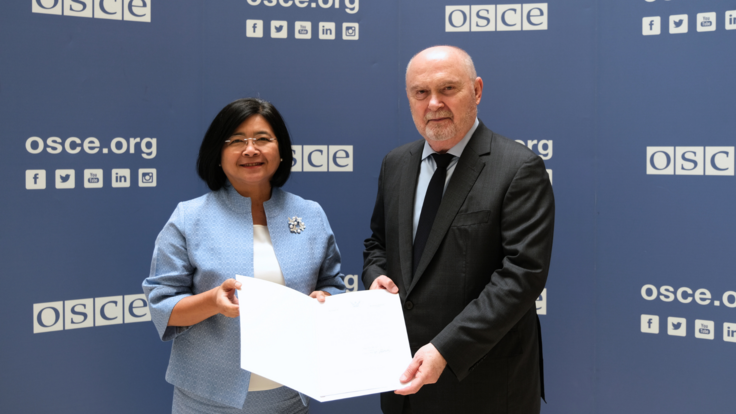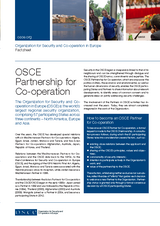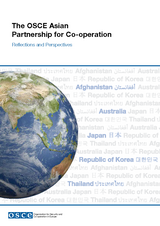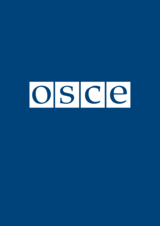-
Our work
-
Fields of work
- Arms control
- Border management
- Combating trafficking in human beings
- Conflict prevention and resolution
- Countering terrorism
- Cyber/ICT Security
- Democratization
- Economic activities
- Education
- Elections
- Environmental activities
- Gender equality
- Good governance
- Human rights
- Media freedom and development
- Migration
- National minority issues
- Policing
- Reform and co-operation in the security sector
- Roma and Sinti
- Rule of law
- Tolerance and non-discrimination
- Youth
- Field operations
- Projects
-
Meetings and conferences
- Summit meetings
- Review Conferences
- Ministerial Council meetings
- Plenary meetings of the Permanent Council
- Plenary Meetings of the Forum for Security Co-operation
- Security Review Conferences
- Annual Implementation Assessment Meetings
- Economic and Environmental Forum
- Economic and Environmental Dimension Implementation Meetings
- Human rights meetings
- Media conferences
- Cyber/ICT security conferences
- Conference of the Alliance against Trafficking in Persons
- Gender equality conferences
- Annual OSCE Mediterranean conferences
- Annual OSCE Asian conferences
- Partnerships
-
Fields of work
-
Countries
- All
-
Participating States
- Albania
- Andorra
- Armenia
- Austria
- Azerbaijan
- Belgium
- Belarus
- Bosnia and Herzegovina
- Bulgaria
- Canada
- Croatia
- Cyprus
- Czechia
- Denmark
- Estonia
- Finland
- France
- Georgia
- Germany
- Greece
- Holy See
- Hungary
- Iceland
- Ireland
- Italy
- Kazakhstan
- Kyrgyzstan
- Latvia
- Liechtenstein
- Lithuania
- Luxembourg
- Malta
- Moldova
- Monaco
- Mongolia
- Montenegro
- The Netherlands
- North Macedonia
- Norway
- Poland
- Portugal
- Romania
- Russian Federation
- San Marino
- Serbia
- Slovakia
- Slovenia
- Spain
- Sweden
- Switzerland – OSCE Chairpersonship 2026
- Tajikistan
- Türkiye
- Turkmenistan
- Ukraine
- United Kingdom
- United States of America
- Uzbekistan
- Asian Partners for Co-operation
- Mediterranean Partners for Co-operation
-
Structures and institutions
- Chairpersonship
-
Secretariat
- Secretary General
- Office of the Secretary General
- Conflict Prevention Centre
- Transnational Threats Department
- Office of the Special Representative and Co-ordinator for Combating Trafficking in Human Beings
- Office of the Co-ordinator of OSCE Economic and Environmental Activities
- Gender Issues Programme
- Opportunities for Youth
- Department of Human Resources
- Department of Management and Finance
- Office of Internal Oversight
- Documentation Centre in Prague
- Institutions
-
Field operations
- Presence in Albania
- Centre in Ashgabat
- Programme Office in Astana
- Programme Office in Bishkek
- Mission to Bosnia and Herzegovina
- Programme Office in Dushanbe
- Mission in Kosovo
- Mission to Moldova
- Mission to Montenegro
- Mission to Serbia
- Mission to Skopje
- Project Co-ordinator in Uzbekistan
- Closed field activities
- Parliamentary Assembly
- Court of Conciliation and Arbitration
- Organizational structure
- About us
Partner States
The OSCE maintains privileged relations with 5 Asian Partners for Co-operation:
- Afghanistan
- Australia
- Japan
- The Republic of Korea
- Thailand
Events
Past and upcoming events and conferences
News and activities
Latest activities related to the OSCE Asian Partners for Co-operation
The framework
In 2003, the Permanent Council created a Contact Group for the OSCE’s Asian Partner States, which in 2019 was renamed the OSCE Asian Partners for Co-operation Group. This informal subsidiary body to the Permanent Council allows the Partners to keep abreast of events and activities in the OSCE area and the participating States to learn about the main issues concerning the Partners’ region.
Asian Partners regularly participate as observers in meetings of the OSCE Ministerial Council, Permanent Council and Forum for Security Co-operation. They also participate in annual OSCE events, such as the Annual Security Review Conference, Economic and Environmental Forum, the Warsaw Human Dimension Conference, and the Annual and Winter Sessions of the OSCE Parliamentary Assembly.
The OSCE holds a conference with the Asian Partners on an annual basis, giving the participating States and Partners the opportunity to exchange views and further develop the OSCE's relationship with its Partners.
The OSCE and its Asian partners regularly organize thematic discussions throughout the year on issues of common interest, such as economic connectivity or climate-related security risks. Under the lead of the Republic of Korea and the OSCE, inter-regional conferences also bring together participating States and Asian Partners to address shared security challenges, such as cyber/ICT security and the impact of emerging technologies on peace and security.
Asian Partners are regularly invited to send observers to the Office for Democratic Institutions and Human Rights' electoral missions and to second staff members on a voluntary basis to OSCE field operations.
Credentials
Heads of Delegations of the OSCE Partners for Co-operation presenting their credentials to the OSCE

H.E. Pattarat Hongtong, Ambassador and Permanent Representative of the Kingdom of Thailand to the OSCE, with the OSCE Secretary General Feridun H. Sinirlioğlu, Vienna, 17 March 2025.
Background
Several Asian Partners started to foster a flexible dialogue with the CSCECSCE
Conference on Security and Co-operation in Europe/OSCE in the early 1990s, when the Organization was taking on a more formal structure. This was also a time when the participating States were increasingly concerned with new security risks that emerged after the end of the Cold War. Japan's partnership started in 1992, Korea's in 1994, Thailand's in 2000, Afghanistan's in 2003, Mongolia's in 2004 (it became a participating State in 2012) and Australia’s in 2009.
Several OSCE documents, such as the 1975 Helsinki Final Act Preamble, 1999 Istanbul Charter for European Security and the 2003 Maastricht OSCE Strategy to Address Threats to Security and Stability in the XXI Century, emphasize the interlinkage between European security and the broader context of world security.
Ongoing dialogue and joint activities with the Asian Partners give them and the OSCE a platform to share their expertise and provide insights into security-related developments. Over the years, the Organization has shared its experience on a broad band of topics with the Asian Partners, including:
- economic connectivity;
- emerging technologies and its impact on the security domain;
- the role of youth in peacebuilding;
- climate-related security risks;
- new security threats and a new security paradigm;
- conflict prevention in new security circumstances;
- the applicability of OSCE confidence- and security-building measures in Asia;
- the human dimension of security;
- comprehensive security in Central Asia; and
- anti-trafficking approaches.
Resources
Official OSCE documents, publications, guidelines and other resource material









